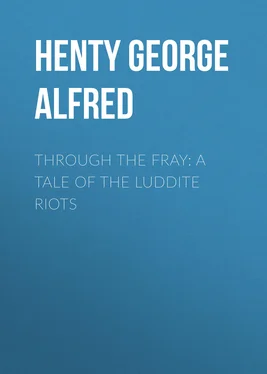George Henty - Through the Fray - A Tale of the Luddite Riots
Здесь есть возможность читать онлайн «George Henty - Through the Fray - A Tale of the Luddite Riots» — ознакомительный отрывок электронной книги совершенно бесплатно, а после прочтения отрывка купить полную версию. В некоторых случаях можно слушать аудио, скачать через торрент в формате fb2 и присутствует краткое содержание. Жанр: foreign_children, foreign_antique, foreign_prose, на английском языке. Описание произведения, (предисловие) а так же отзывы посетителей доступны на портале библиотеки ЛибКат.
- Название:Through the Fray: A Tale of the Luddite Riots
- Автор:
- Жанр:
- Год:неизвестен
- ISBN:нет данных
- Рейтинг книги:5 / 5. Голосов: 1
-
Избранное:Добавить в избранное
- Отзывы:
-
Ваша оценка:
- 100
- 1
- 2
- 3
- 4
- 5
Through the Fray: A Tale of the Luddite Riots: краткое содержание, описание и аннотация
Предлагаем к чтению аннотацию, описание, краткое содержание или предисловие (зависит от того, что написал сам автор книги «Through the Fray: A Tale of the Luddite Riots»). Если вы не нашли необходимую информацию о книге — напишите в комментариях, мы постараемся отыскать её.
Through the Fray: A Tale of the Luddite Riots — читать онлайн ознакомительный отрывок
Ниже представлен текст книги, разбитый по страницам. Система сохранения места последней прочитанной страницы, позволяет с удобством читать онлайн бесплатно книгу «Through the Fray: A Tale of the Luddite Riots», без необходимости каждый раз заново искать на чём Вы остановились. Поставьте закладку, и сможете в любой момент перейти на страницу, на которой закончили чтение.
Интервал:
Закладка:
“Now, Loiza, there’s one point as oi wish settled. As oi have told ye, oi ha’ partly chosen ye becos oi knowed as how ye would maake a good mother to my little Polly; but oi doan’t mean to give up taking her down with me o’ days to the town. Oi likes to ha’ her wi’ me on the roade—it makes it shorter like. As thou knowest thyself, oi ha’ bin a chaanged man sin she coom. There warn’t a cropper in the village drank harder nor oi, but oi maad oop moi moind when she came to gi’ it up, and oi have gi’d it up.”
“I know, Luke,” the girl said, “I wouldna have had ye, hadn’t ye doon so, as I told ye two years agone. I know the child ha’ done it, and I loves her for it, and will be a good mother to her.”
“Oi knows you will, Loiza, and oi bain’t feared as ye’ll be jealous if so be as ye’ve children o’ your own. Oi shan’t love ‘em a bit the less coss oi loves little Polly. She be just the image o’ what moi sister Jane was when she war a little thing and oi used to take care o’ her. Mother she didn’t belong to this village, and the rough ways of the men and the drink frightened her. She war quiet and tidy and neat in her ways, and Jane took arter her, and glad she was when the time came to marry and get away from Varley. Oi be roight sure if she knows owt what’s going on down here, she would be glad to know as her child ain’t bein’ brought oop in Varley ways. I ha’ arranged wi’ the woman where she gets her meals for her to go to school wi’ her own children. Dost thee object to that, lass?—if so, say so noo afore it’s too late, but doon’t thraw it in moi face arterwards. Ef thou’st children they shalt go to school too. Oi don’t want to do more for Polly nor oi’d do for moi own.”
“I ha’ no objection, Luke. I remembers your sister, how pretty and quiet she wor; and thou shalt do what you likest wi’ Polly, wi’out no grumble from me.”
Eliza Marner kept the promise she had made before marriage faithfully. If she ever felt in her heart any jealousy as she saw Polly growing up a pretty bright little maiden, as different to the usual child product of Varley as could well be, she was wise enough never to express her thoughts, and behaved with motherly kindness to her in the evening hours spent at home. She would perhaps have felt the task a harder one had her own elder children been girls; but three boys came first, and a girl was not born until she had been married eleven years. Polly, who was now fourteen, had just come home from her schooling at Marsden for good, and was about to go out into service there. But after the birth of her little girl Mrs. Marner, who had never for a Varley girl been strong, faded rapidly away; and Polly’s stay at home, intended at first to last but a few weeks, until its mother was about again, extended into months.
The failing woman reaped now the benefit of Polly’s training. Her gentle, quiet way, her soft voice, her neatness and tidiness, made her an excellent nurse, and she devoted herself to cheer and brighten the sickroom of the woman who had made so kind an adopted mother to her. Her influence kept even the rough boys quiet; and all Varley, which had at first been unanimous in its condemnation of the manner in which Luke Marner was bringing up that “gal” of his, just as if the place was not good enough for her, were now forced to confess that the experiment had turned out well.
“Polly, my dear,” the sick woman said to her one afternoon when the girl had been reading to her for some time, and was now busy mending some of the boys’ clothes, while baby, nearly a year old, was gravely amusing herself with a battered doll upon the floor, “I used to think, though I never said so, as your feyther war making a mistake in bringing you up different to other gals here; but I see as he was right. There ain’t one of them as would have been content to give up all their time and thoughts to a sick woman as thou hast done. There ain’t a house in the village as tidy and comfortable as this, and the boys mind you as they never minded me. When I am gone Luke will miss me, but thar won’t be no difference in his comfort, and I know thou’lt look arter baby and be a mother to her. I don’t suppose as thou wilt stay here long; thou art over fifteen now, and the lads will not be long afore they begin to come a-coorting of thee. But doan’t ee marry in Varley, Polly. My Luke’s been a good husband to me. But thou know’st what the most of them be—they may do for Varley bred gals, but not for the like of thee. And when thou goest take baby wi’ thee and bring her up like thysel till she be old enough to coom back and look arter Luke and the house.”
Polly was crying quietly while the dying woman was speaking. The doctor, on leaving that morning, had told her that he could do no more and that Mrs. Marner was sinking rapidly. Kneeling now beside the bed she promised to do all that her adopted mother asked her, adding, “and I shall never, never leave feyther as long as he lives.”
The woman smiled faintly.
“Many a girl ha’ said that afore now, Polly, and ha’ changed her moind when the roight man asked her. Don’t ee make any promises that away, lass. ‘Tis natural that, when a lassie’s time comes, she should wed; and if Luke feels loanly here, why he’s got it in his power to get another to keep house for him. He be but a little over forty now; and as he ha’ lived steady and kept hisself away from drink, he be a yoonger man now nor many a one ten year yoonger. Don’t ye think to go to sacrifice your loife to hissen. And now, child, read me that chapter over agin, and then I think I could sleep a bit.”
Before morning Eliza Marner had passed away, and Polly became the head of her uncle’s house. Two years had passed, and so far Mary Powlett showed no signs of leaving the house, which, even the many women in the village, who envied her for her prettiness and neatness and disliked her for what they called her airs, acknowledged that she managed well. But it was not from lack of suitors. There were at least half a dozen stalwart young croppers who would gladly have paid court to her had there been the smallest sign on her part of willingness to accept their attentions; but Polly, though bright and cheerful and pleasant to all, afforded to none of them an opportunity for anything approaching intimacy.
On Sundays, the times alone when their occupations enabled the youth of Varley to devote themselves to attentions to the maidens they favored, Mary Powlett was not to be found at home after breakfast, for, having set everything in readiness for dinner, she always started for Marsden, taking little Susan with her, and there spent the day with the woman who had even more than Eliza Marner been her mother. She had, a month after his wife’s death, fought a battle with Luke and conquered. The latter had, in pursuance of the plans he had originally drawn up for her, proposed that she should go into service at Marsden.
“Oi shall miss thee sorely, Polly,” he said; “and oi doan’t disguise it from thee, vor the last year, lass, thou hast been the light o’ this house, and oi couldna have spared ye. But oi ha’ always fixed that thou shouldst go into service at Marsden—Varley is not fit vor the likes o’ ye. We be a rough lot here, and a drunken; and though oi shall miss thee sorely for awhile, oi must larn to do wi’out thee.”
Polly heard him in silence, and then positively refused to go.
“You have been all to me, feyther, since I was a child, and I am not going to leave you now. I don’t say that Varley is altogether nice, but I shall be very happy here with you and the boys and dear little Susan, and I am not going to leave, and so—there!”
Luke knew well how great would be the void which her absence would make, but he still struggled to carry out his plans.
Читать дальшеИнтервал:
Закладка:
Похожие книги на «Through the Fray: A Tale of the Luddite Riots»
Представляем Вашему вниманию похожие книги на «Through the Fray: A Tale of the Luddite Riots» списком для выбора. Мы отобрали схожую по названию и смыслу литературу в надежде предоставить читателям больше вариантов отыскать новые, интересные, ещё непрочитанные произведения.
Обсуждение, отзывы о книге «Through the Fray: A Tale of the Luddite Riots» и просто собственные мнения читателей. Оставьте ваши комментарии, напишите, что Вы думаете о произведении, его смысле или главных героях. Укажите что конкретно понравилось, а что нет, и почему Вы так считаете.












